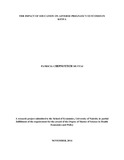| dc.description.abstract | Pregnancy outcomes are often considered a litmus test for the health of a nation. Many Kenyan
women endure a lifetime of poor health and poor nutritional status as a direct consequence of
societal, cultural, political and economic factors. These factors aggravate their risks during
pregnancy and childbirth hence making them vulnerable to adverse pregnancy outcomes. This
paper aims to demonstrate the impact of education on adverse pregnancy outcomes in Kenya
using the Kenya Demographic and Health Survey (KDHS) datasets for 2003 and 2008. The
experience of adverse pregnancy outcomes is measured using an indicator of whether or not a
woman has ever had a pregnancy that was aborted, miscarried of ended in a stillbirth. This paper
adopts the 2SRI estimation strategy that controls for potential endogeneity of education and
potential unobserved heterogeneity. Comparing the two datasets, our findings show mixed
results. For 2008, achieving secondary and higher education reduces the probability of a mother
experiencing a miscarriage, stillbirth, or an abortion however 2003 has a contrary finding that is
insignificant. We recommend policies that support mothers to achieve secondary education and
even higher education as one way of reducing the experience of adverse pregnancy outcomes. | en_US |

